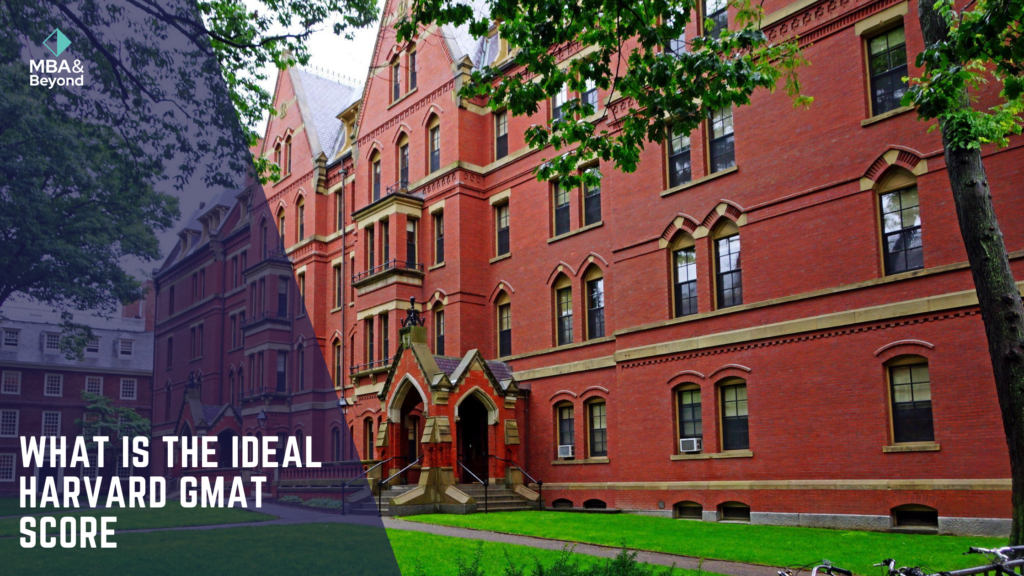Harvard MBA GMAT Scores & Class Profile Requirements

Applying to Harvard Business School (HBS) is a dream for many aspiring business leaders. The road to Harvard, however, is both exciting and competitive. Among the key elements Harvard assesses is the GMAT score, which reflects an applicant’s analytical, quantitative, and verbal abilities—skills essential for the HBS MBA program.
Here’s the breakdown: while the average GMAT score for admitted students hovers around 740, HBS doesn’t set a strict minimum requirement. This means that although a high GMAT score can strengthen your application, it’s not the only factor that matters. HBS looks at the whole picture, weighing your academic achievements, work experience, recommendations, and personal essays, along with your test scores.
In this guide, we’ll go over the typical GMAT score range for Harvard, explain how the GMAT fits into the broader application process, and offer tips for putting together a strong application. Whether you’re targeting a high score or evaluating how your current score compares, we’ll help you understand what it takes to stand out in the HBS admissions process.
What’s the Ideal Harvard MBA GMAT Score
For the Harvard MBA Class of 2025, setting a high bar in academic excellence is key, particularly when it comes to quantitative and analytical abilities. The average GMAT score for admitted students this year is 740, reflecting Harvard’s rigorous expectations.
During the application process, you’ll need to submit either a GMAT or GRE score as part of your application. This score serves as a key indicator of your readiness for Harvard’s rigorous MBA curriculum. Here’s a quick look at the median scores:
| GMAT Median Total: | 740 |
| GRE Median Total: | 163 |
As you prepare, tools like GMAT calculators can also help you estimate your score as you aim for that competitive range.
Significance of Harvard MBA GMAT in the Selection Process
When applying to Harvard Business School, the GMAT score is one of the most important indicators of your academic potential. But how much weight does it really carry? Harvard uses the GMAT as a way to assess your quantitative and verbal reasoning skills, but there are no strict cut-offs. Harvard’s application process consists of multiple rounds (usually three rounds, each with specific deadlines), and the competitiveness of your GMAT score can vary slightly depending on which round you apply in.
GMAT and GRE Acceptance:
HBS accepts both the GMAT and GRE, with no preference for one over the other. Harvard encourages applicants to take the test they feel best represents their skills. However, keep in mind that most applicants tend to submit GMAT scores, and the median GMAT score for the latest class at Harvard is quite competitive.
Typical GMAT Score Range:
Although HBS does not publish a minimum required score, the average GMAT score for admitted students in recent years has hovered around 730 to 740. This median score places Harvard candidates in the 95th percentile of all test-takers, making it clear that high performance on the GMAT can be a strong asset in the admissions process. Applicants with a score near or above this median have a clear advantage, particularly in the earlier rounds.
Application Rounds and Timing:
Harvard’s application process has three rounds. Applying in Round 1 or Round 2 is often encouraged for those with highly competitive profiles (including strong GMAT scores), as this is when the majority of admissions spots are filled. Round 3 is more selective due to the limited seats available, so a strong GMAT score can help boost an application in the later rounds, but it’s not the only deciding factor.
While a great GMAT score strengthens your profile, Harvard’s admissions process is about much more than just numbers. HBS evaluates each applicant holistically, so let’s take a look at the other key factors—like your GPA, work experience, and personal essays—that also play a critical role in determining your fit for the program.
What are the Additional Factors except GMAT
Apart from the GMAT, Harvard Business School (HBS) considers several important factors for MBA admissions that collectively contribute to a holistic evaluation of each candidate:
GPA and Academic Background:
Harvard seeks candidates who have shown strong academic performance, intellectual curiosity, and commitment to excellence. In building a diverse class, Harvard values a wide range of experiences, backgrounds, and perspectives. The average GPA for admitted students is 3.73, indicating the school’s high standards but also its openness to a range of academic profiles.
Work Experience:
Work experience plays a significant role in Harvard’s MBA admissions, complementing academic scores. It reflects an applicant’s professional maturity, leadership potential, and the ability to bring varied perspectives to the program. Strong work experience not only strengthens quantitative and analytical skills, essential for the rigorous curriculum, but also enhances career opportunities post-graduation. For the Class of 2025, incoming students averaged five years of work experience, underscoring Harvard’s emphasis on depth and diversity of professional backgrounds.
Letters of Recommendation (LORs):
Harvard requires two letters of recommendation, ideally from individuals who know you well professionally and can provide insights into your leadership qualities, teamwork skills, and key accomplishments. These recommendations offer a personalized look at your potential and highlight the unique qualities you’d bring to the Harvard community.
Essays:
The application essays are a key opportunity to share your career aspirations, reflect on personal growth, and explain how Harvard will help you achieve your goals. Through these essays, Harvard looks for:
- Demonstrated leadership qualities and vision
- Strong analytical abilities and problem-solving skills
- A track record of community involvement and impact
Interview:
After initial application review, Harvard may invite you for an interview to better understand your goals, communication style, and leadership potential. This interview is your chance to showcase fit with the Harvard community and demonstrate the interpersonal skills essential for the program’s collaborative environment.
Want to pursue an MBA but not sure if your profile fits?
Talk to our Profile Experts to know your chances for a top MBA Program.
GET A FREE PROFILE ANALYSISWhat Does the Harvard MBA Class Profile Reveal About Its Selection Criteria
The Harvard MBA Class of 2025 profile offers intriguing insights into the characteristics Harvard Business School (HBS) values in its selection process. The incoming class consists of 938 students chosen from a pool of 8,149 applicants, showcasing a notably competitive selection process. Highlighting HBS’s commitment to global representation and gender balance, the class includes 39% international students from 66 countries and 45% women. Here’s what the numbers reveal about HBS’s preferences and priorities:
Key Statistics of the HBS Class of 2025
| Attribute | Details |
| Average Age | 27 |
| GPA | 3.73 |
| Average Work Experience | 5 Years |
| Class Size | 938 |
| Female Students | 45% |
| International Students | 39% |
| Nationalities Represented | 61 |
| Undergraduate Majors | 25% engineering, 22% business/commerce, 21% economics |
| Pre-MBA Industry | Consulting (17%), Finance (10%), Technology (13%), Consumer Goods (10%), Other (63%) |
| Pre-MBA Roles | Consulting (25%), Finance (35%), Engineering/IT (16%), Other (23%) |
| GMAT Score Range | 500-790 |
| Median GMAT Score | 740 |
Conclusion
In sum, a strong GMAT score is an asset for Harvard Business School applicants, demonstrating academic ability and analytical skills that align with Harvard’s challenging curriculum. However, Harvard’s holistic admissions approach means that a balanced application—one that highlights your unique experiences, leadership abilities, and professional accomplishments—can make just as significant an impact as a high GMAT score.
While Harvard’s median GMAT score of 740 represents a high benchmark, it’s essential to remember that Harvard values diverse backgrounds and exceptional achievements across various fields. So, whether you’re aiming to raise your GMAT score or strengthening other parts of your application, understanding the role of the GMAT score in your Harvard MBA journey is a significant step forward.
If you need more in-depth information about any particular aspect of the application process, interviews, and course structure, feel free to hop on a 1:1 call with our team of experts.





Leave a Reply